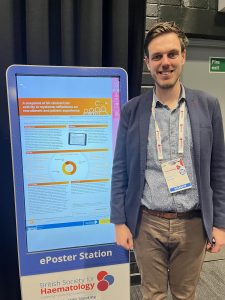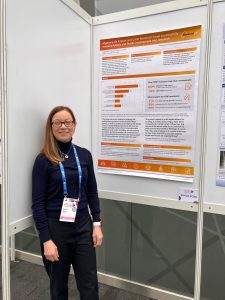Myeloma UK once again had a strong presence at the British Society of Haematology (BSH) Annual Conference this year. Held in Liverpool, 28–30 April, both our Health Services Research (HSR) and Clinical Practice Services (CPS) teams showcased their teams work addressing the myeloma patient experience in clinical trials, and how patient and public involvement can positively influence research.
Both teams work emphasised the importance, and benefits, of a patient-focused approach to the management and development of clinical trials.
A snapshot of UK clinical trial activity in myeloma: reflections on recruitment and patient experience

Rhys Owens, Myeloma UK’s Senior Projects Officer, presenting his poster about clinical trial activity at BSH
Clinical Practice Services Senior Projects Officer Rhys Owens presented a thought-provoking poster providing a snapshot of clinical trial activity in myeloma, using data collected from CSEP accredited hospitals and Patient Experience Surveys.
The results shed light on the disparity between the number of patients offered a place at a trial and those who went on to participate. Understanding more about factors influencing trial access and patient choice is important in identifying strategies to increase trial participation, particularly for minority ethnic groups who are often under-represented.
The work also highlighted the importance of informing patients of trial results and asking about their experience. This helps patients understand how their participation has contributed to wider myeloma research and informs a patient-centred approach to trial development.
If you’d like to read more about how one of our CSEP-accredited hospitals is working to improve access to clinical trials for myeloma patients, you can read our Shared Practice article here >
Transforming myeloma research together: the overwhelming impact of patient and public involvement

Dr Sandra Quinn, Principal Research in Applied Health Research presenting her team’s poster (lead author Dr Tom Lewis) evidencing the impact of PPI in reframing a study and it’s outcomes, at BSH.
One poster analysed how PPI could reframe a study and its outcomes to improve the relevance to myeloma patients and carers , explored how the Myeloma UK Patient and Carer Research Panel (PCRP) can be used to successfully embed PPI into haemato-oncology research.
Both of these inspiring posters were presented by co-author Dr Sandra Quinn, Myeloma UK’s Principal Researcher in Applied Health Research.
The results of Dr Lewis’ insightful research demonstrated PPI-driven improvement to study relevance and outcomes. By embedding a Service User Advisory Group (SUAG) into a project investigating diagnosis, treatment and wellbeing of individuals throughout their cancer journey and ensuring feedback loops throughout the study development, the principal investigator (PI) successfully refocused the analysis, ensuring that participant perspectives enhanced the themes explored.
Dr Sandra Quinn, Principal Research in Applied Health Research presenting her team’s poster (lead author Dr Lauren Kelly) demonstrating how the Myeloma UK PCRP can be used to successfully embed PPO into research, at BSH.
Dr Kelly’s results, following a survey of PCRP members, revealed that 100% of the panel felt they had a moderate to high impact on the internal and external research they were involved in. Similarly, researchers engaging with the panel also reported excellent collaboration and outputs including shaping of trial design and strengthening funding applications.
Professor Gordon Cook, Consultant Haematologist and Principal Investigator on the FiTNEss study said:
“The panel were very helpful in shaping the patient-facing element of the trial [FiTNEss study], as well as guiding and shaping the design. This is a world-leading trial which will have an impact clinically in the UK and internationally. “
